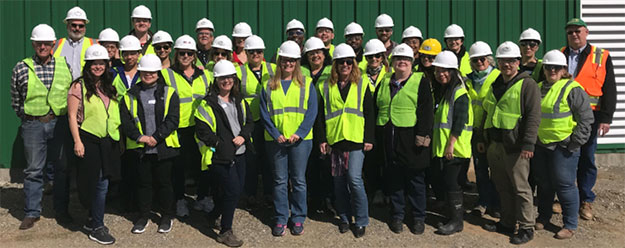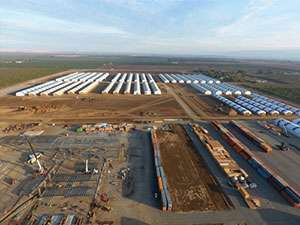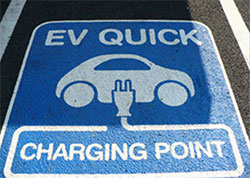April 2020 Articles
Newsletter Downloads
- April 2020
HTML version, PDF version - March 2020
HTML version, PDF version - February 2020
HTML version, PDF version - January 2020
HTML version, PDF version - Year-End Highlights 2019
HTML version, PDF version
ABCs of the BCAs
April 2020
The California Pollution Control Financing Authority (CPCFA)
Greening California Since 1972

The California Pollution Control Financing Authority – one of 16 boards, commissions and authorities overseen by State Treasurer Fiona Ma – may well be the original “green bank” in California. Established in 1972 to issue tax-exempt bonds for privately-owned waste and recycling projects, CPCFA is today uniquely qualified to attract private capital to business enterprises using public financing and incentives that can help California be economically prosperous, environmentally clean, and resilient to climate change. CPCFA’s financing programs stimulate environmental cleanup, community economic development, and job growth throughout the state.
CPCFA is a statewide flag bearer in the issuance of green bonds and new technologies for solid waste, waste water, recycling, and water furnishing infrastructure. It offers businesses innovative and prudent financial risk mitigation tools and embraces new financing technologies. It encourages and supports climate resilient community-driven projects that restore the environment, protect the public health, and promote economic independence – especially in disadvantaged and underserved communities.
CPCFA’s Strategy for a Green, Resilient California
CPCFA’s menu of high-impact financing programs include its Tax-Exempt Bond Program, California Capital Access Program (CalCAP), and the California Recycle Underutilized Sites (CALReUSE) Program.
As a recognized subject matter expert in environmental financing, CPCFA partners with sister state agencies to help achieve California’s environmental and climate policy objectives, administering specialized financing programs designed to assist regulated entities and other stakeholders with cash flow and the “de-risking” of their projects.
Tax-Exempt Pollution Control Projects Include:
✓ Recycling
✓ Composting & Anaerboic Digest
✓ Materials Recovery & Transfer Stations
✓ Waste-to-Energy
✓ Landfills
✓ Solid Waste & Hazardous Waste Disposal
✓ Desalination Plants
✓ Curbside Collection Vehicles, Bins & Carts
✓ Wastewater Treatment
✓ Water Furnishing
Pollution Control Tax-Exempt Bond Program
CPCFA is a national leader as a conduit bond issuer for private pollution control facilities that partner with local governments to upgrade drinking water distribution systems and manage solid waste and waste water systems. More than 85 percent of the public waste-related utilities serving residential and commercial buildings in California are constructed and operated by private companies. CPCFA’s private activity bond financing can be highly effective in lowering the price of debt for these municipal projects.
The Pollution Control Tax-Exempt Bond Financing Program takes advantage of federal tax benefits allocated to California by the Internal Revenue Service. Under this program, private companies both small and large can issue low-cost bonds for specific waste and recycling projects, and pay the bonds off using rate-payer fees or other revenue earned from the facility over the life of the project or facility. In turn, the bondholders can claim a tax exemption on returns on their investment, passing through the savings to the borrower through lower interest rates. Unlike corporate bonds, private activity bonds issued through CPCFA help to “de-risk” the investment and make it easier for unrated companies to finance the construction or expansion of important infrastructure. The securities pay for acquisition, construction or installation of qualified pollution control, water furnishing, waste disposal, waste recovery facilities and equipment.
As the state’s primary conduit issuer of pollution control tax-exempt bonds, CPCFA to date has issued more than $16.2 billion for projects that stimulate environmental cleanup, economic development, job growth and climate resilience.
Bond proceeds can pay for the purchase, construction and operation of pollution control projects, including the upgrade of lower- or zero-emission vehicles used by a waste company, and the construction and operation of anaerobic digesters.
Beginning in the 1980s, CPCFA assessed a small fee on bond issuances to large businesses to establish the Small Business Assistance Fund (SBAF), to offset the costs of issuance for small business borrowers.
CPCFA is a Green Bond Pioneer
The Green Bond Pledge is a joint initiative developed and designed by international climate finance and environmental groups including the California Treasurer’s Office, California Governor’s Office, Climate Bonds Initiative, Mission 2020, CDP, Ceres, Citizens Climate Lobby, Global Optimism, National Resources Defense Council, and The Climate Group.
CPCFA is the first statewide financing authority in California to become a signatory to the Green Bond Pledge.

The Green Bond Pledge is a simple declaration with a broad and far-reaching impact. It acknowledges that climate change is real, and that intentional investments in infrastructure and capital projects that address environmental impact and climate risk represent a globally accepted and preferred strategy to directly mitigate climate change in our communities. Green bonds are an assurance of the beneficial environmental and climate outcomes of infrastructure projects and related investments. A green bond designation signals that these imperatives are being deliberately incorporated into the planning and deployment of projects funded through this market mechanism.
Following the lead of the California State Treasurer, CPCFA began actively accelerating the green bond market in October 2018 when it became the first statewide financing authority to sign the Green Bond Pledge. The Board now designates CPCFA’s financing as “green bonds,” consistent with global climate standards. The Board’s twin aims are to meet the challenges of climate change and to transform California into a more competitive, resilient and healthy economy for all its residents.

CalPlant I, located outside of Willows in Glenn County, is one example of a CPCFA Green Bond project. The plant, which has been issued $308 million in Green Bonds, will turn rice straw to medium density fiberboard and reduce methane emissions, water usage and VOCs (volatile organic compounds). The 112-million-square-feet of fiberboard expected to be produced each year will also offset out-of-state wood as feedstock for the home building industry. The first boards are scheduled to roll off the line in June 2020.
CPCFA’s Green Bond Issuance
With the addition of formally designated Green Bonds, CPCFA’s tax-exempt and taxable muni portfolio is attracting investors to critical projects in California. Since 1973, most of CPCFA’s bond issuances for environmental waste management, recycling and water furnishing projects have likely met the project selection criteria for green bond financing based on the use and management of proceeds. Now, by accepting an independent verification or third party certification that the project meets the commonly accepted standards of the global climate bond market, CPCFA issues bonds formally denominated as “green.” The clear yet flexible framework adopted by the CPCFA Board has received support from leading bond counsel and investors alike. Under this framework, CPCFA has issued $434 million in tax-exempt and taxable Green Bonds.
CPCFA works closely as an advisor to the State Treasurer and her Treasurer’s Green Bond Market Development Committee, and is actively consulting with officials in Governor Gavin Newsom’s administration to support the success of the State’s proposed investments in climate mitigation and resiliency.
California Capital Access Program (CalCAP)
In 1994 CPCFA created the California Capital Access Program (CalCAP) to encourage banks and other lenders to make loans to small businesses that have difficulty obtaining financing. To date, CalCAP lenders have enrolled 22,388 loans totaling nearly $1.9 billion through CalCAP for Small Business.
Small businesses are widely applauded as the economic engine of local communities, yet face entrenched barriers to accessing affordable financing for start-up, expansion, and working capital. The CalCAP Program can ensure that access by providing participating lenders a “loan loss reserve fund.” These funds give lenders added financial protection in the event a qualifying loan defaults. The program has proven an effective way to encourage lenders to make more loans on favorable terms to small businesses.
While each lender is entirely liable for its own loan losses, those losses can be reimbursed from each lender’s loan loss reserve account. The loss reserve accounts are built through fees paid by the borrower and lender, and matching contributions made by CPCFA. The benefit of a loan loss reserve fund is that it may provide participating lenders with up to 100 percent coverage on losses.
Interested small businesses should contact participating lending institutions on the CalCAP for Small Business lender list to complete a loan enrollment application.
CalCAP Supports Small Green Businesses
CPCFA also offers several specialty programs based on CalCAP, with added incentives for certain types of businesses. CPCFA is a statewide leader in rewarding small business efforts to “go green” in either their operations, or their service and product offerings. CalCAP offers enhanced incentives for green businesses or capital improvement projects through its Collateral Support Program. Extra credit enhancements are available to support green manufacturing loans, and also loans to businesses impacted by climate-related disasters. Businesses can use CalCAP loan proceeds toward start-up costs, working capital, franchise fees, equipment, inventory, and the purchase, construction, renovation or improvements of an eligible place of business. Several organic recycling projects awaiting federal loan guarantees have been able to proceed with construction with the help of CalCAP’s bridge loan financing support.
Interested small businesses should contact participating lending institutions on the Collateral Support Program lender list to complete a loan enrollment application.

Did You Know? In order to meet California’s aggressive targets for newer and cleaner diesel, natural gas, and zero emission vehicles necessary to protect our communities and the environment, beginning January of this year, the Department of Motor Vehicles will not register any commercial vehicle that does not meet the requirements of the Truck and Bus Regulation.
CalCAP is Turning Trucking Fleets Green
CPCFA also partners with sister state agencies like the California Air Resources Board (CARB) and the California Energy Commission to achieve the State’s environmental policy objectives by offering special loan programs to help regulated entities and other stakeholders access private capital and adopt green transportation technologies.
In partnership with CARB, CPCFA offers the Truck Loan Assistance Program to provide financial assistance to truckers who need to upgrade their medium and heavy trucks to comply with the State Truck and Bus Regulation. The truck loan program opens up private financing to qualified owner/operators with small fleets who fall below conventional lending criteria and are unable to qualify for traditional financing. By funding a loss reserve account for each clean truck loan enrolled in the program, private lenders can offer small business owner-operators the needed financing on more favorable terms and interest rates. Pretty much everything we eat, wear, and use arrives at our homes, schools and work places aboard a truck. This program is substantively helping to ensure that cleaner trucks are hauling our consumer goods. With the transportation sector representing the biggest source of harmful emissions, CPCFA’s program is critical to meeting California’s air quality goals.
“California’s aggressive targets for newer and cleaner diesel, natural gas, and zero emission vehicles are necessary to protect our communities and the environment. I’m happy to support small business fleet owners in buying cleaner trucks that move goods, support our economy and help our state meet our air quality targets.”
— Fiona Ma, California State Treasurer and CPCFA Board Chair
Since 2009, more than 25,000 loans to small business truck owners purchasing more than 26,000 cleaner trucks have been enrolled in the Truck Loan Assistance Program. Over the past 10 years that equates to the removal of 4 million passenger cars from the road and 145 tons per year of particulate matter. CARB has contributed $119 million from its Air Quality Improvement Program to CPCFA, which invests the funds in loan loss reserve accounts for participating lenders.
To meet the legislative intent and criteria for the Truck Loan Assistance Program and provide smaller fleets more financing opportunities, the program is open to qualified trucking fleets with 10 or fewer heavy-duty vehicles. Eligible trucking companies must also meet certain basic requirements. These include qualifying as a small business (fewer than 100 employees), generating less than $10 million in annual revenue, and operating primarily in California.
Vehicles Available for Financing
✓ Used and new trucks with 2010 and newer model year engines CARB-certified to 2010 and later model year emission standards.
✓ Cleaner diesel, compressed natural gas, hybrid, and electric trucks.
✓ Aerodynamic trailers, in conjunction with an eligible tractor.
Small business truck owners can access this program by contacting participating institutions on the CalCAP/CARB lenders list to complete a loan application themselves, or by working to coordinate funding through their preferred truck dealer and the identified lenders.
CPCFA Accelerates Electric Vehicle Charging Station Installation
Treasurer Ma’s support of electric vehicle charging stations is long-standing. While a state lawmaker in 2011 she shepherded into law AB 631, enabling the fair market development of electric vehicle infrastructure throughout California.

CPCFA’s CalCAP Electric Vehicle Charging Station Program (CalCAP/EVCS) is one more example of how the Treasurer’s Office is creating critical infrastructure to save our energy, clean our air, and meet the state’s goal of phasing out fossil fuels from our electrical grid. Introduced in 2015, the program aims to expand the number of electric vehicle charging stations found in California by providing small business owners incentives to finance the acquisition and installation of electric vehicle charging station equipment.
A business that installs electric vehicle charging stations not only helps us spread electric vehicle usage, it also can attract new customers. Almost any corporation, partnership, cooperative or other entity with 1,000 or fewer employees is eligible to borrow through the program.

An electric vehicle charging station installed in Fresno, CA by Green Commuter, a participant in the CalCAP/EVCS loan program. Green Commuter (with a $500,000 loan enrollment) installed 57 charging stations at banks, churches, a shopping center and a community events center - all in disadvantaged communities.
Thanks to a $2 million pilot program funded by the California Energy Commission, loans enrolled in this program can cover the design, development, purchase, and installation of electric vehicle charging stations. This partnership allows CalCAP to provide up to 100 percent coverage to lenders on certain loan defaults.
Enrolled loans are provided coverage for up to 48 months and up to $500,000 per borrower. Borrowers with good repayment history may be eligible to receive a rebate of 10 percent of the enrolled loan amount payable from the lenders’ loss reserve accounts, plus added incentives if the EVCS installation is located at a multi-unit dwelling or in a disadvantaged community.
The program benefits electric vehicle users and local governments by providing a financial solution to accelerating the implementation of electric vehicle readiness plans. It also helps small businesses acquire capital for electric vehicle infrastructure and state and local communities to stay in step with local air quality and transportation policy goals.
Small businesses can reach out to CalCAP/EVCS participating lenders for charging station financing.
CALReUSE is Cleaning Up Contaminated Properties for Housing Production and Economic Development
Since 2000, the mission of CPCFA’s California Recycle Underutilized Sites (CALReUSE) Assessment and Remediation Program has been to mitigate environmental and public health hazards historically associated with the use of brownfields in order to unlock their potential to accommodate housing and economic developments in communities throughout California. CALREUSE achieves both. It aids climate mitigation by remediating harmful carbon emissions. And it promotes climate resilience by promoting sustainable community development of underutilized infill properties, particularly in disadvantaged communities.
CALReUSE’s strength is in linking and leveraging California’s environmental and housing goals together in one program. Where the Department of Toxic Substance Control (DTSC) and the State Water Resources Control Board (Water Board) are primarily focused on mitigating environmental hazards on one hand, and the Department of Housing and Community Development (HCD) on meeting the state’s housing needs on the other, CALReUSE elegantly and effectively achieves both policy goals. CALReUSE expands beyond these regulatory agencies’ efforts by collaborating with the private development and investment sectors to evaluate and remediate, going beyond barriers that have blocked climate-resilient community development and revitalization.
The CALReUSE Program is currently seeking additional capital funding to award revolving loans and grants for brownfield assessment and remediation to accelerate new projects, especially affordable housing developments. The proposal for additional funding accelerates Governor Newsom’s and Treasurer Ma’s shared interest in increasing housing production, expanding jobs and combating climate change. It also acknowledges the housing shortage cannot be overcome without unlocking every underused brownfield.
There is considerable community benefit in remediating brownfields, beginning with significant reduction of harmful carbon emissions. CALReUSE has a proven record of transforming properties beset by soil, groundwater, and structural contamination. CALReUSE provides the critical early money needed for assessment and remediation, to accelerate private capital investment in successful housing development and other economic development projects.
CALReUSE Assessment Program Funding
In 2000, CPCFA self-funded a one-time allocation of $6.4 million for the CALReUSE Assessment Program to provide forgivable loans for the assessment of contaminated land. CPCFA’s self-funded this program from a one-time excess in administrative fees collected by CPCFA’s Tax-Exempt Bond Financing Program, following the 1990s when bond issuance and fee revenue were abundant. The administrative fees from CPCFA Bond issuances no longer generate enough funding to support the assessment program. CPCFA has exhausted the current balance available in the CALReUSE assessment program.
CALReUSE Remediation Program Funding
The Housing and Emergency Shelter Trust Fund Act of 2006 (Proposition 1C), authorized CPCFA to issue loans or grants to clean up contaminated land and promote new housing in California. The Remediation Program was funded with a one-time appropriation of $60 million from the general obligation bond. CPCFA’s awards have exhausted the current balance available in the CALReUSE Remediation Program.
CALReUSE Program’s Environmental and Housing Success
The CALReUSE Program continues to demonstrate that assessment and remediation of brownfield properties are critical steps in transforming vacant and underutilized properties as California moves to expand its housing inventory and to accelerate local economic development opportunities, particularly in disadvantaged communities.
Since 2001, CPCFA has awarded more than $61 million to 74 CALReUSE projects for the assessment and cleanup of brownfields across California’s rural, urban, and low-income communities. Though established prior to any Legislative directive with regard to California Climate Investment (CCI) targets, the CALReUSE Program has far exceeded CCI’s target of investing 25 percent of state funds in disadvantaged communities. In addition, 51 percent of the CALReUSE projects are serving disadvantaged communities.
Upon final expenditure of the Program’s current funding and awards, CPCFA anticipates a total investment of $3.8 billion of public and private funds will have assisted in the creation of 8,347 new housing units statewide, 3,847 of them affordable.

In Richmond, CA the 14-acre site of a derelict and contaminated former nursery was transformed into affordable housing for seniors. The site was deemed a brownfield. It was contaminated by pesticides and lead. When completed in 2021, the development will include creek restoration, reuse of preserved historic structures, including greenhouses and homes dating to the 1900s. The senior rental housing included in the project provides 79 affordable apartments for residents who earn 30-45 percent of the Area Median Income. Thirty of the 190 for-sale units are classified as affordable.
From a Past of Environmental Mistakes to a Carbon Neutral Future
CPCFA’s team within the State Treasurer’s Office will continue to serve as forward-thinking subject matter experts when it comes to creative funding and financing of projects big and small in the environmental sector. The CPCFA team is knowledgeable and dedicated to widening the flow of capital funding and financing to make California economically prosperous and environmentally clean. With Treasurer Ma’s full support of Governor Newsom’s ambition to invest boldly in California’s climate resilience, CPCFA looks forward to partnering with all state, local and nongovernmental organizations to mitigate our past environmental mistakes and achieve carbon neutrality in the future.
Note: Each month we will be sharing information on one of our BCAs and explain how the programs behind the acronym are enhancing the lives of Californians all across the state -- and how you, your family, or your business can share in, and contribute to, California’s prosperity.





